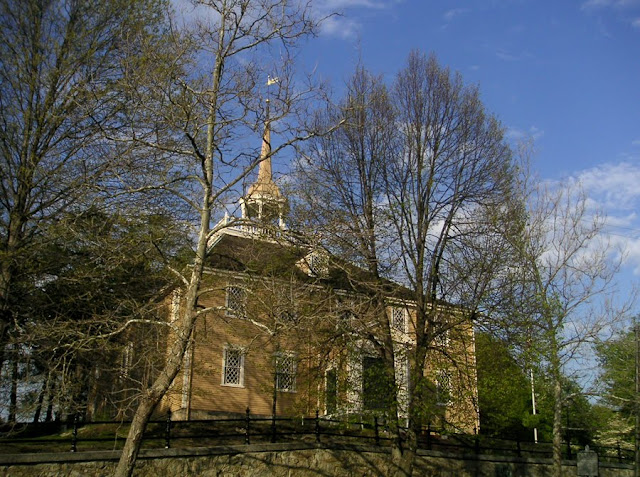After reading a couple of your comments, I should say that the huge wooden beams inside are reminiscent of those used in ship-building. I didn't get a chance to see the inside, because it was late in the day when we visited.
"The Old Ship Church is the oldest meetinghouse in continuous ecclesiastical use in the United States" [see The Old Ship Church link above] and is "the only remaining 17th century Puritan meetinghouse in America." It is also famous for its hammerbeam roof, constructed in a bold Gothic style. The Washington Post said, "Within the church, 'the ceiling, made of great oak beams, looks like the inverted frame of a ship.' "
At least two of my immigrant ancestors, Thomas Joy and his wife, Joan Gallop, are buried behind the church along with ancestors of Abraham Lincoln and are still listed on web sites as notable burials in the churchyard. I'll post photos of the cemetery in future blog entries. After arriving in the New World in 1635, Thomas Joy, a carpenter, made his home in Boston, where he built wharves and a number of other buildings. Although styled as "a carpenter," he in fact became one of the area's most prominent builders and architects. He built the first Town-House (Town Hall) in Boston "from his own design," which we know from an extant contract dated 1657. The Town House burned down in 1711 and was replaced by The Old State House.
The building of the Town-House in Boston took place after Joy's return to Boston. He had moved to Hingham (about 12 miles from Boston) about 1646 to enlarge a grist mill and establish a sawmill, and had stayed for a number of years. He had been persecuted in Boston by Governor Winthrop because Joy had signed a petition to grant suffrage to a greater number of men than had been allowed under the colonial government which, "since 1631 had restricted the right of suffrage to the members of the local Puritan churches, excluding more than three-fourths of the adult male population from any participation in public affairs." [Thomas Joy and His Descendants, p. 14, by James Richard Joy.] Thomas Joy had acquired property in both locations, but died in Hingham in 1678.
Thomas died a few years before the 1681 construction date given for The Old Ship Meeting House, but it has many features of Boston's first Town House, which Thomas Joy designed and built. The 1681 Old Ship replaced a "first rude meetinghouse." I don't see Thomas Joy listed anywhere in conjunction with the design of The Old Ship Meetinghouse, but his influence was certainly felt and emulated.
I would also like to honor the memory of Bradner (Brad) Petersen, and thank him posthumously for compiling and writing the book, Ancestry of the Jameson,Gilbert, Joy, Skinner and Related Families, which has been and continues to be such a tremendous resource for me.

2 comments:
Well, my dear, you are begging the question: Why "The Old Ship Church"? I've seen churches that look like ships - in fact, many are built specifically to reflect that fact that the "faithful" are safely aboard through the rough waters of life...thus, they worship in the "nave."
But this doesn't look like a ship...
It's a gorgeous photo, though...love the blue, blue dky and the light stabbing at the roof and spire.
It's a beautiful old building, whether it looks like a ship or not! :)
Post a Comment